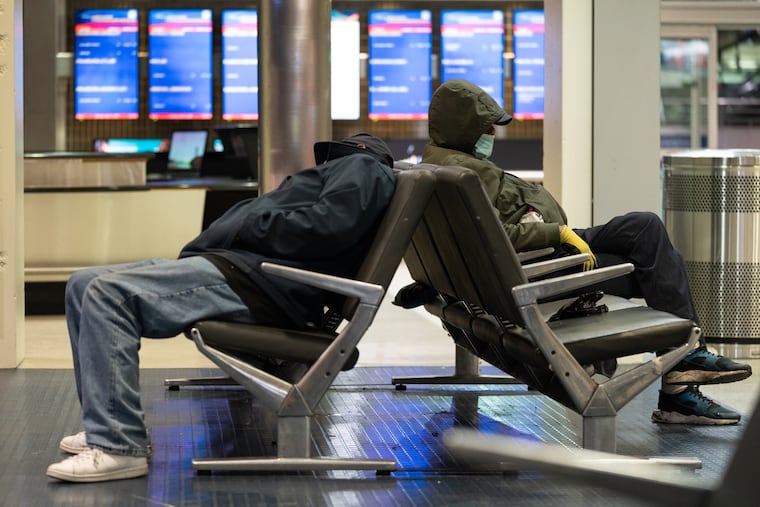Homeless advocates consider lawsuit if city breaks up airport encampment without COVID testing
“It’s a no-brainer” to test people before placing them in a building where they could infect others, one advocate said.

Homeless service providers and advocates are contemplating suing the City of Philadelphia to prevent it from moving homeless people living at Philadelphia International Airport into shelters on Friday without first testing them for the coronavirus.
Late Wednesday, providers and advocates met by phone, with at least one of them decrying as “disastrous” the city’s plan to disperse as many as 150 individuals.
Those who serve and house the homeless cited Philadelphia’s decision in late March to clear a homeless encampment at the Convention Center and place some of the people in a Center City shelter, Our Brother’s Place.
A subsequent outbreak of coronavirus there infected more than three dozen residents, and a 46-year-old man died on April 2. He is the only known coronavirus fatality among more than 5,000 individuals living in shelters.
“If the airport people are placed in shelters without being tested, the city is almost guaranteeing the same thing will happen again,” said David Fair, a member of the board of SELF, the largest provider of emergency housing in the city. He was the city’s deputy commissioner for AIDS in the early 1980s.
“It’s a no-brainer to test these people before putting them in a building where they could infect others. We’ve decided to sign on to any potential lawsuit.”
He added that SELF president and COO Michael Hinson was asked by the city this week to take in airport residents and that he “told them no” unless the city tested for the virus.
Hinson said in a statement that he believes that “individuals accessing emergency shelter should be tested for COVID-19 prior to shelter placement, including individuals currently at the airport. It will likely decrease the risk of exposure for homeless individuals already living in emergency housing and the team members at our and other emergency housing sites.”
While city spokesperson Mike Dunn declined to comment on possible litigation, he said it is unsafe for people who are homeless to live at the airport. He said that outreach workers have “identified beds for all the individuals there,” and that those living at the facility are being screened for illness. People who need medical care are getting it, he said.
“We are confident," Dunn said, "that moving forward will lead to a solution that meets the needs of these individuals for a safe place to stay and other supports, while allowing ... [the airport] to fulfill its primary mandate — to maintain and operate a functional facility that enables safe air travel.”
‘Disastrous’
Marsha Cohen, executive director of the Homeless Advocacy Project, an advocacy group, said that because doctors know that many patients afflicted with the virus are asymptomatic, placing the airport population into congregate settings “could be disastrous.”
“I don’t want to sue unless it’s necessary," she said. "But what happened at Our Brother’s Place is uppermost in people’s minds. And there have been other outbreaks. It’s really troubling.”
» READ MORE: 150 homeless people camped out at Philadelphia airport will be relocated, officials say
People who are homeless are more likely to succumb to the coronavirus, she said, because they see doctors infrequently, live in rough environments, and often suffer from underlying conditions that exacerbate illness.
It’s possible, Cohen added, that all homeless care providers will decide not to accept people from the airport, following SELF’s lead. “The result,” she said, “is that we’ll have avoided the threat to shelter populations, but the individuals from the airport would still be without a place to go.”
Earlier Wednesday, an airport spokeswoman said that the airport would begin enforcing new regulations at 7 a.m. Friday allowing only employees and travelers access to the facility.
Those without airport business “won’t be welcome in the terminals” and will be “strongly urged to leave,” she said.
Many not from Philly
Many of those living at the airport come from Delaware County and other locales outside Philadelphia, both advocates and city officials said. Advocates added that a large group of those who are homeless at the facility are mentally ill and unwilling to live in shelters.
Many of the people in the airport encampment don’t stay there all day, advocates said. Quite a few leave in the morning, and return at night only to sleep.
» HELP US REPORT: Are you a health care worker, medical provider, government worker, patient, frontline worker or other expert? We want to hear from you.
The airport had permitted people to shelter there during the coronavirus crisis, and had directed them to Terminal A-East, which has not been in use for flights.
But, advocates said, they were told that the terminal will be used again starting around June 4.
A serious security breach occurred at the airport on May 2, when a man who was believed to be homeless was found in the bathroom of a Southwest Airlines plane as the flight crew prepared it for boarding.
At the same time, tensions have been rising between city officials and those who serve and house the homeless.
The death in April of the resident at Our Brother’s Place roiled advocates and providers, who pointed out that the city had disbanded the Convention Center encampment after the U.S. Centers for Disease Control and Prevention issued a ruling stipulating that such groupings should not be cleared during the coronavirus crisis.
“This increases the potential for infectious disease spread,” the CDC said.
Eva Gladstein, deputy managing director of health and human services for the city, disputed the idea that moving people from the street hastened the virus’ spread through Our Brother’s Place.
“It’s a false correlation,” she said.
The Philadelphia Inquirer is one of more than 20 news organizations producing Broke in Philly, a collaborative reporting project on solutions to poverty and the city’s push toward economic justice. See all of our reporting at brokeinphilly.org.